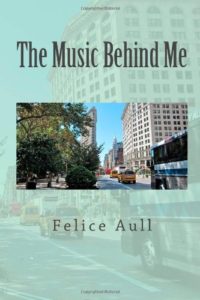 Review by Nancy Vona
Review by Nancy Vona
– Felice Aull’s The Music Behind Me is a fine book of poetry. Aull’s poems are satisfying to read. I enjoyed the poems on an emotional level, but I was also challenged to be a better poet, to think more carefully about my choice of line breaks, and to consider how to make the ordinary astonishing and unique.
The poems in this volume, like all good poems, illuminate the senses—especially the sense of hearing. The Music Behind Me is a book about sound–the sounds of wind, city sounds, “word songs” uttered in prison, and in particular music—how it anchors us to the present, evokes memory, and heals us.
In the title poem, Aull describes her initial sense of exasperation, then jubilation and connection while walking down a city street and hearing someone blast music from a boom box:
The music behind me
on the city street where I walked
was loud, bounced and flung
me around so even though
I was annoyed at the sound
that made me turn,
I felt giddy.
The line breaks reinforce the meaning of the poem—as I read “bounced and flung/me around so even though/I was annoyed” I felt –well, bounced and flung around. The description of the noisy music connects the reader to a particular moment; this and other poems are grounded by imagery in time and place, whether it’s the streets of Manhattan or the Italian Alps in springtime.
This book is also about words and silence. Objects communicate when words fail us; gifts bind us to the people we love, as we try to sustain relationships in a peripatetic world. In “From International Public Health Worker,” the speaker describes gifts she’s received from her daughter.
You bring me earrings,
a small silver box,
blue stones mined by
dark people I will never know.
This is your way of
staying bound to me,…
In this short poem, the one or two-syllabled words are direct, clear and effective: adjectives such as small, silver, and blue describe the gifts. The simple language makes the rest of the poem all the more powerful:
the cord stretching from
continent to continent,
my fear, your daring,
the arc suspended
now taut, now slack.
Much is compressed into these five lines—a mother’s love and concern, a daughter’s resilience, and an emotional connection that is dynamic and changing.
The poems are satisfyingly multilayered—there are sounds and objects described, but the subtext is about journeys taken: the journey of a homeless man wandering a few steps away from his neighborhood, travels in alpine Italy, passengers boarding an airplane at night, a transformation from illness to healing.
In “Not a Concert,” Aull offers a glimpse into one such journey of healing by describing chamber music played in a “cancer center lobby”:
you strain to focus on
the violin’s excited song,
the cello’s undertone
but no, impossible to grasp the music
or the lives of turbaned women
and bald men holding canes.
“Not a Concert” is evocative and haunting because the simple, clear language allows the unsettling tone of the poem to emerge. The choice of second person singular point of view underscores the sense of distance the speaker feels in the situation.
I knew I was reading a well-crafted book of poetry when I had trouble choosing poems to quote in this review—they’re all good. Obviously, I couldn’t quote the entire book so I encourage you to buy it and read it for yourself. The Music Behind Me is Aull’s first volume of poetry, and I look forward to her next collection.
The Music Behind Me
By Felice Aull
Alabaster Leaves Publishing, 2012
43 pages, $14
Nancy Vona writes essays, poetry and fiction, and loves creating with words. She has been published in Literary Mama, The Mom Egg, Tidings, and Rushlight. She lives in Massachusetts with her husband, two sons, an elderly dog and an energetic puppy.
Please consider sharing your love of poetry by buying this or another book reviewed on The Mom Egg website and gifting a book to someone—or keeping it for yourself. Let’s support our fellow Mom Egg contributors. Wouldn’t it be lovely if poetry books became the gift of choice, augmenting ties, mugs, bags of coffee or even chocolate? –Nancy Vona
